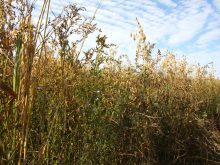Canada can now export certified organic products to U. S. markets without getting American certification, now that both countries have agreed to accept each other’s national standards for organic food.
The long-awaited equivalency agreement, announced by the Canadian Food Inspection Agency (CFIA) and the U. S Department of Agriculture (USDA) June 17, means organic farmers and food processors certified by either the USDA’s National Organic Program or the Canada Organic Product Regulation no longer need go through a second certification process.
The agreement is an historic first and deemed key to improving trade of organic goods between the two countries.
Read Also

Farm Credit Canada forecasts higher farm costs for 2026
Canadian farmers should brace for higher costs in 2026, Farm Credit Canada warns, although there’s some bright financial news for cattle
Under the arrangement, the CFIA can now recognize certification bodies in the U. S. to ensure they comply with the Canadian standards.
The equivalency agreement, long awaited by organic farmers in Manitoba, means less work to certify.
“What farmers have been doing up until now is certifying to each of the standards where they anticipate a market,” said Priscilla Reimer, chair of the Manitoba Organic Alliance, which organized in March to speak for the sector in this province.
“(Now) They can simply be certified to the Canadian one.”
Word last week that Canada’s Organic Products Regulations (OPR) will come into force June 30 is also something organic farmers have awaiting, Reimer said. The regulation means all products labelled as organic and being traded inter-provincially or exported must be certified to the National Standards of Canada for Organic Agriculture by a CFIA accredited/recognized certification body.
“The entire sector … we’ve all be holding our breath on this,” Reimer said. “But we’re moving ahead now and that’s excellent news for all of us. We’ll finally have the standard we’ve been working on for a long time.”
Manitoba will be the first Canadian province to also introduce provincial laws on organic trade – Bill 13: The Organic Agricultural Products Act– which will govern organic produce traded within the province. However, that act won’t be proclaimed as planned June 30.
Manitoba Agriculture Food and Rural Initiatives’ organic specialist John Hollinger said the province and is still finalizing its agreement with the CFIA, which will handle enforcement. He said he’s optimistic the provincial act will be in place later this summer.
That buys MOA a bit more time to explore how to accommodate organic producers who choose to remain uncertified in Manitoba. Some have said the procedure costs too much and isn’t something their customers demand.
MOA has struck a working committee to continue to look alternatives for these producers, Reimer said.
“This absolutely needs resolution,” Reimer said. “We’re continuing to look at that issue and hope to come up with some suggestions or alternatives.”















